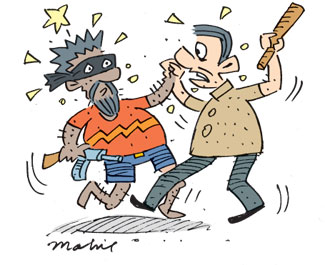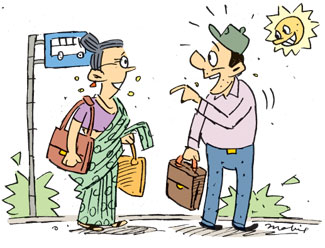|

by R. S. Karunaratne
Different
types of words
The wordstock of English consists of different types of words. These
are classified according to the way they are used. Basically, there are
nine different types of words.
|

Velusumana fought like a lion. |
1. Ordinary or literal words. These words have no hidden meanings.
Mother gave me a cup of coffee.
Shyamala is a well-known journalist.
My English teacher was a kind person.
Do you travel by bus?
Everybody wants to be happy.
2. Figurative words
These words have a hidden meaning. Similes and metaphors belong to
this category.
Velusumana fought like a lion. (Simile)
Velusumana was a lion in the fight. (Metaphor)
We compare Velusamana to a lion because he is brave. We mean just
that and no more.
3. Literary words
These are the words used by authors, poets and literary critics. We
hardly use them in conversation.
Leela was the protagonist in the novel.
The film had a lot of flashbacks.
The novelist has used the stream of consciousness method.
4. Colloquial words
Colloquial words are used in everyday speech. Some colloquial words
are slightly vulgar and they are not used in civilised society.
I know that chap.
That guy is following me.
5. Slang words
|

Do you travel by bus? |
These are inadmissible or taboo on polite occasions. Some slang words
gain currency in polite language.
The defeated party is trying to stage a come-back.
6. Poetic words
Poets have a 'poetic licence' to use certain words in poetry. Some of
the words they use include: 'thou, ere, morn, eve, oft and zephyr.
7. Technical words
Every profession has its own stock of technical or specialised words.
Some of these words cannot be understood by outsiders.
I want to insert this obit in the Sunday Observer. (Obituary)
'To be run out' is a technical term used in cricket.
Visual aids are used in education.
The lawyer was warned not to ask leading questions. (eg. So, you were
there at the murder scene?)
8. Commercial words
These are used in business. Some of the commercial words used in the
past such as 'herewith, in receipt of, the same, ditto, ultimo, even
date' have been discarded.
9. Foreign words
English has borrowed many foreign terms mainly from Latin and French.
Following foreign words seen to be in the process of becoming English.
ad infinitum (Latin) to infinity
Chic: stylish
Ennui: mental weariness resulting from boredom
Faux pas: (French) a false step
Nom de plume: (French) a pen-name
Viva voce: (Latin) an oral examination.
Know the roots of
English words
The root of a word is the part of it common to all allied words.
Modern English words have grown from old English, Latin and Greek roots.
It is interesting and useful to know them.
Here is a short list of old English roots. Note the modern English
words derived from them.
beaten (to strike): bat, batter, battle, beat
beran (to carry): bear, berth, bier, birth, brood, brother, burden
bindan (to bind): band, bandage, bind, bond, bondage, bundle
brecan (to break): brake, breach, break, breakfast, brick, brittle
ceapian (to buy): cheap, cheapen, chop
cwic (alive): quick, quicken, quicksand, quickest, quicksilver
dragan (to drag): drag, draught, draw
faran (to go): far, ferry, thoroughfare, welfare
fleotan (to float): afloat, fleet, float, flotsam
foda (food): feed, fodder, food, forage, foray, foster
grafan (to dig): engrave, graft, grave, groove, grove
sceran (to cut): score, scrap, scrape, share, sharp, shear, sheer,
sheriff, shire, shirt, shore, short, shred, skirt
slagan (to strike): slaughter, slay, sledge-hammer, slog
stede (place): farmstead, homestead, instead, steady
tredan (to walk): trade, tradesman, treat
twa (two): between, twain, twin, two
wegan (to move): wag, wagon, way, weigh
witan (to know): to wit, wisdom, wise, wit, witness
wyrt (herb): orchard
In addition to the old English roots, Englishmen borrowed Latin and
Greek words to hold their own in the new world. Here is a short list of
some of the common Latin roots and modern English words derived from
them.
aequus (equal, impartial): adequate, equality, equator, equinox,
equity, equitable, equivalent
altus (high): altar, altitude, exalt
amo (I love): amateur, amiable, amity, amorous
annus (year): anniversary, annual, annuity, biennial
aqua (water): aquarium, aquatic
audio (I hear): audible, audience, auditorium
brevis (short): abbreviate, brief, brevity
capio (I take): capacity, captivate, captive, capture
(To be continued)
Starters :
The present perfect
tense
We form the present perfect tense with the present tense of 'to have'
+ the past participle. The Past participle of regular verbs has the same
form as the simple past. In irregular verbs the past participle vary.
Affirmative
I have worked. (first person singular)
You have worked. (Second person singular)
He has worked. (Third person singular)
We have worked (First person plural)
You have worked (Second person plural)
They have worked (Third person plural)
Negative
I have not worked.
You have not worked.
He has not worked.
We have not worked.
You have not worked.
They have not worked.
Interrogative
Have I worked?
Have you worked?
Has he worked?
Have we worked?
Have you worked?
Have they worked?
Negative interrogative
Have I not worked?
Have you not worked?
Has he not worked?
Have we not worked?
Have you not worked?
Have they not worked?
Contractions
Have not: Haven't
Has not: Hasn't
The present perfect tense is a mixture of present and past tenses. It
is chiefly used in conversation, letters, newspapers and news bulletins.
The present perfect tense is used with 'just' to express a recently
completed action.
Rumy has just gone out. (= Rumy went out a few minutes ago)
('Just' is used between the auxiliary verb (has) and the main verb
(gone). If is chiefly used in the affirmative.
We used the present perfect tense for past actions with no time
expressions.
I have read God Father
A: Have you had lunch?
B: Yes, I have/No, I haven't had it yet.
Yes, I had it a little while ago.
I have seen lawyers wearing black coats.
(= They still wear black coats)
Jayasena has written many novels.
(= He is still living and writing novels)
We use the present perfect tense with 'lately' recently; and 'yet'.
We have seen a lot of changes in Colombo recently.
I haven't passed the examination yet.
He has worked in our factory lately.
We use the present perfect tense with a word or phrase denoting an
incomplete period of time.
Have you seen Manel today? (= at any time today)
We haven't seen any films this week.
(= at any time during this week)
We use the present perfect tense with a time expression.
I have been a journalist for ten years (= I am still a journalist)
He has smoked since he left school (= He still smokes)
We have lived in Colombo all our lives (= We still live in Colombo)
I have never been to London.
She has always worked with me. (= She still works with me)
Note how we use 'for' and 'since' with the present perfect tense.
We have lived in Colombo for 20 years.
We have lived in Colombo since 1980.
Print and electronic media use the present perfect tense in news
bulletins.
The Government has temporarily suspended the city expansion project.
************
Making plurals
To make the plural of many nouns we add -s. However, for nouns
ending in sh, ch or x, we add es to form the plural. For certain
nouns ending in y, we change it to i and add es. For certain nouns
ending in f we change it to v and add es to make the plural. After
studying the rules turn the following nouns to the plural form. Check
your answers with the key.
1. bird ................
2. cook ................
3. head ................
4. bush ................
5. bunch ................
6. coach ................
7. fly ................
8. pony ................
9. elf ................
10. shelf ................
11. loaf ................
12. farmer ................
13. tree ................
14. chair ................
15. brush ................
16. box ................
17. dish ................
18. berry ................
19. story ................
20. lady ................
21. half ................
22. calf ................
23. leaf ................
24. river ................
25. coat ................
26. church ................
27. match ................
28. city ................
29. penny ................
30. wolf ................
************
[Key]
1. birds
2. cooks
3. heads
4. bushes
5. bunches
6. coaches
7. flies
8. ponies
9. elves
10. shelves
11. loaves
12. farmers
13. trees
14. chairs
15. brushes
16. boxes
17. dishes
18. berries
19. stories
20. ladies
21. halves
22. calves
23.leaves
24. rivers
25. coats
26. churches
27. matches
28. cities
29. pennies
30. wolves |

